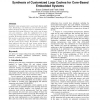Free Online Productivity Tools
i2Speak
i2Symbol
i2OCR
iTex2Img
iWeb2Print
iWeb2Shot
i2Type
iPdf2Split
iPdf2Merge
i2Bopomofo
i2Arabic
i2Style
i2Image
i2PDF
iLatex2Rtf
Sci2ools
107
click to vote
ICCAD
2002
IEEE
2002
IEEE
Synthesis of customized loop caches for core-based embedded systems
Embedded system programs tend to spend much time in small loops. Introducing a very small loop cache into the instruction memory hierarchy has thus been shown to substantially reduce instruction fetch energy. However, loop caches come in many sizes and variations – using the configuration best on the average may actually result in worsened energy for a specific program. We therefore introduce a loop cache exploration tool that analyzes a particular program’s profile, rapidly explores the possible configurations, and generates the configuration with the greatest power savings. We introduce a simulationbased approach and show the good energy savings that a customized loop cache yields. We also introduce a fast estimation-based approach that obtains nearly the same results in seconds rather than tens of minutes or hours. Keywords Low power, low energy, tuning, loop cache, embedded systems, instruction fetching, customized architectures, memory hierarchy, estimation, synthesis.
| Added | 16 Mar 2010 |
| Updated | 16 Mar 2010 |
| Type | Conference |
| Year | 2002 |
| Where | ICCAD |
| Authors | Susan Cotterell, Frank Vahid |
Comments (0)

